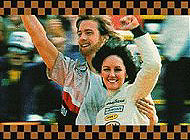|
|
|
|
Heart
Like a Wheel
|
 |
|
Now here's a movie that's built for comfort and built for speed, to use the splendid words of a song inside it. Jonathan Kaplan's film is a vivid, 'novelistic' B movie; meaning that it's the kind of tale – exceedingly rare these days – which tells the (true) story of a female racing-car driver beginning with a sepia-toned flashback to little Shirley Muldowney (immortally played as an adult by Bonnie Bedelia) on her dear Daddy's knee in the driver's seat, gingerly putting her hands to the steering wheel and feeling the thrill of it all. And that's only the start of Kaplan's intense, shameless, vigorous way with the clichés of the typical sporting success story. We proceed, with nary a pause, through Daddy's death, marriage, son, divorce, new boyfriend, accident on the track, recovery, media exploitation, winning the big race ... From the outside, all no doubt fairly predictable; but on the inside, always skilfully undercut or savagely unleashed at just the right moment, with a striking use of transitions across the years that the film covers. To describe Heart Like a Wheel as all plot – which, in one way, it is – would miss all the rich reflectiveness that goes on in and across its story: its exemplary populist-feminism; its balancing of Shirley's deep love for he biological father with her struggle with all the symbolic fathers on the track ('Big daddy' Garlits, officials ... ); its extraordinary sketch of familial joys and tensions, crack-ups and redemptions; its almost epic novelistic sense of time moving, leaving no small amount of interpersonal failure in its wake. This film is not with the couple, not even with the few precious shards of family that remain (Shirley and son); its most special and intense moments are those that show Shirley's absolute autonomy and solitude, moments always isolated and emphasised in the mise en scène. The most the film expects from relationships and friendships is a special kind of empathy free from the ravages of time – as in the electric sign that proclaims: "Shirley, We're With You!" Apart from its themes, beautifully shaped and realised, Heart Like a Wheel is an object-lesson in cinematic energy and electricity: the kind of film (again rare) which bats the structures of looking, screen space and camera movement in so many directions and to so many second-to-second expressive ends that it leaves much critical terminology entirely for dead. The scene of the father's death – a stunning ellipse bridged by Hoyt Axton's gorgeous song "You Taught Me How To Cry", voice and guitar mixed up high, strings well down – is about as daring and poignant a piece of direction as can be found in mainstream cinema. And I haven't even mentioned yet how terrific Beau Bridges is. Heart Like a Wheel thankfully restores one's faith in American cinema, and puts Kaplan firmly up among its best and most significant directors. MORE Kaplan: Brokedown Palace, Immediate Family, Love Field, Unlawful Entry, White Line Fever, Fallen Angels, Project X MORE biopics: Ali, Auto Focus, The Aviator, Basquiat, De-Lovely, I Shot Andy Warhol, Kundun, The Life and Death of Peter Sellers, Man on the Moon, Malcolm X, Nixon, The People vs. Larry Flynt, Pollock, What's Love Got to Do With It? © Adrian Martin December 1985 |
![]()